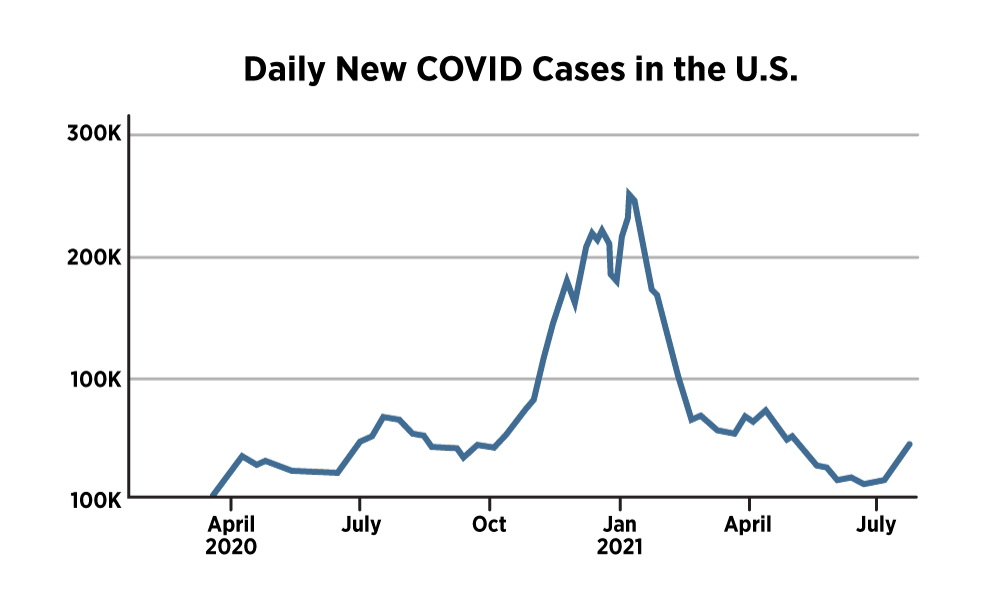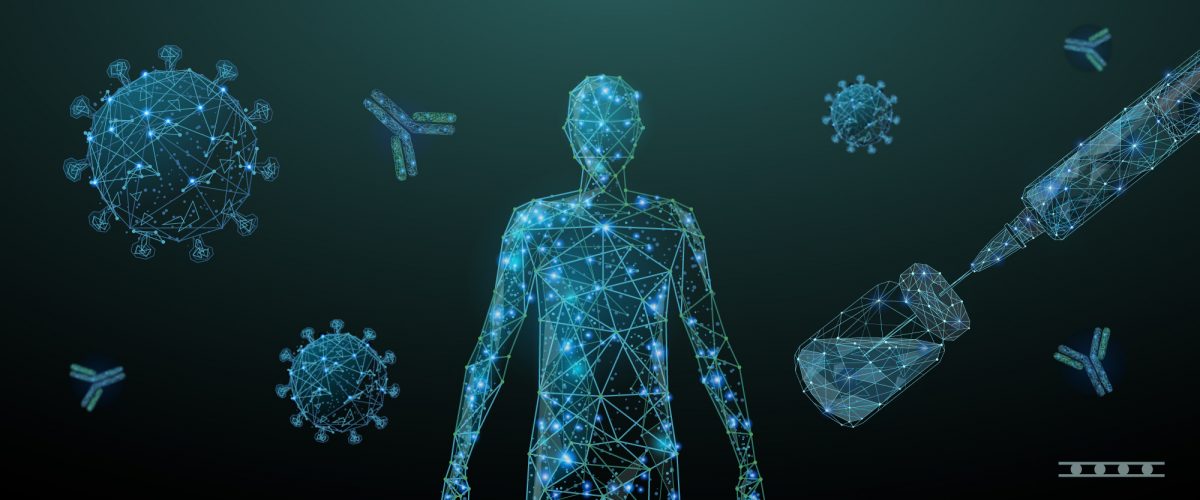As the Delta variant spreads across the world, many vaccinated individuals are worried about the possibility of a breakthrough infection. The term “breakthrough infection” refers to the development of a SARS-CoV-2 infection despite an individual being vaccinated against the virus. With many Americans still reluctant to vaccination, and with mask mandates lifted in most states, the highly contagious Delta variant has contributed to spikes in COVID-19 cases across the nation this summer ’21 (Figure 1). However, breakthrough infections are still uncommon, and over 97% of people being hospitalized for COVID-19 are unvaccinated.1

Figure 1. The recent surge in the Delta variant has brought a spike in COVID-19 cases the summer of 2021. Source: Johns Hopkins University.
The Delta variant and breakthrough infections
The Delta (or B.1.617.2) variant is the fastest spreading form of SARS-CoV-2. An existing question surrounding breakthrough infections is if they are more commonly associated with the Delta variant than with other variants. It was first identified in India and has since become the most dominant coronavirus variant worldwide. The Delta variant differs from the other variants by only a few amino acid changes called point mutations. One of these mutations, P681R, appears to allow the Delta variant to bind more tightly to human cells’ ACE2 receptor, possibly allowing the variant to infect more cells in a given amount of time.2
A possible explanation for why the Delta variant could be contributing to breakthrough infections stems from how it leads to a higher viral load. Individuals infected with the Delta variant have about 1,000-fold more virus in their bodies than those infected with other variants.3 Therefore, a vaccinated person may be more susceptible to infection by the Delta variant than by other variants because if exposed, they would be encountering more viral particles. Additionally, unvaccinated people are contagious for longer when infected with the Delta variant than those who are vaccinated and experience a breakthrough infection.4
I’m already vaccinated- what does this mean for me?
It is important to note that cases of breakthrough infections do not point to a faulty vaccine, as vaccines are meant to prevent illness. Accordingly, most breakthrough infections are asymptomatic or mild, and so vaccinated people are still highly protected from hospitalization or death from COVID-19. As of July 26th 2021, The Centers for Disease Control and Prevention (CDC) reported 6,587 COVID-19 breakthrough cases with 6,239 hospitalizations and 1,263 deaths. Since at that time, more than 163 million people in the United States were fully vaccinated against COVID-19, this equates to 0.004% of fully vaccinated people having a breakthrough infection that led to hospitalization and less than 0.001% of fully vaccinated people died from a breakthrough infection.
A study which tested the effectiveness of vaccination against symptomatic disease caused by the Delta variant or the predominant alpha variant found only modest differences in vaccine effectiveness between the two variants after the receipt of two vaccine doses (88.0% vs 93.7%).5
While those who are vaccinated are highly unlikely to exhibit serious symptoms of a breakthrough infection, vaccinated people can still transmit the virus and may consider wearing masks in populated indoor places to protect themselves and others. The CDC has recently recommended that fully vaccinated people wear masks again indoors in places with high COVID-19 transmission rates.6 However even with this new guidance, state and local governments make the final decision regarding mask mandates.
Breakthrough infections and immunocompromised individuals
Individuals with weakened immune systems are at higher risk of a breakthrough infection. This includes people with diabetes, advanced HIV, organ transplant recipients and cancer patients. Immunocompromised people can produce a weakened, or non-existent, antibody and cellular immune response following vaccination. This is because the immune system in immunocompromised individuals are sometimes unable to provide an adequate immune response. In one study, 46% of organ transplant recipients did not exhibit an antibody response following two doses of an mRNA vaccine.7 The Food and Drug Administration is expected to soon recommend booster shots for immunocompromised people in the next 48 hours.8
Key Takeaways
The risk of getting infected or re-infected with SARS-CoV-2 depends on your odds of exposure and the ability of your body to develop an immune response against it. Close contact and duration of contact are major risk factors for infection. Therefore, if you are in close contact with people with whom you don’t know the vaccination status, extra precautions such as wearing a mask and social distancing is advisable.
Those who are vaccinated are nearly guaranteed to not be hospitalized or die by COVID-19. While breakthrough infections have been reported, these cases are rare, and associated with mild symptoms. Therefore, if you are not vaccinated, it is highly recommended to do so. Individuals with breakthrough infections can possibly still spread the virus. For this reason, the CDC recommends both vaccinated and unvaccinated individuals wear masks in public indoor settings as of July 27th 2021. More data are still needed to definitively conclude whether the highly contagious Delta variant is responsible for more breakthrough infections over other variants. Additional variants have been identified, and will continue to be identified. For this reason, it is important to stay vigilant and adhere to social distancing guidelines.
References
- Press Briefing by White House COVID-19 Response Team and Public Health Officials | The White House. https://www.whitehouse.gov/briefing-room/press-briefings/2021/07/16/press-briefing-by-white-house-covid-19-response-team-and-public-health-officials-45/. Published 2021. Updated 2021-07-16. Accessed.
- Scudellari M. How the coronavirus infects cells — and why Delta is so dangerous. Nature. 2021;595(7869):640-644.
- Li B, Deng A, Li K, et al. Viral infection and transmission in a large, well-traced outbreak caused by the SARS-CoV-2 Delta variant. medRxiv. 2021:2021.2007.2007.21260122.
- Delta Variant: What We Know About the Science | CDC. https://www.cdc.gov/coronavirus/2019-ncov/variants/delta-variant.html. Published 2021. Updated 2021-08-09T04:03:44Z. Accessed.
- Lopez Bernal J, Andrews N, Gower C, et al. Effectiveness of Covid-19 Vaccines against the B.1.617.2 (Delta) Variant. New England Journal of Medicine. 2021.
- When You’ve Been Fully Vaccinated | CDC. https://www.cdc.gov/coronavirus/2019-ncov/vaccines/fully-vaccinated.html. Published 2021. Updated 2021-08-09T05:25:31Z. Accessed.
- Boyarsky BJ, Werbel WA, Avery RK, et al. Antibody Response to 2-Dose SARS-CoV-2 mRNA Vaccine Series in Solid Organ Transplant Recipients. JAMA. 2021;325(21):2204-2206.
- Kaitlan C, John Bonifield CNN. FDA expected to authorize Covid-19 vaccine booster shots for some immunocompromised people within the next 48 hours. https://www.cnn.com/2021/08/11/politics/fda-third-dose-covid-19-vaccine/index.html. Published 2021. Accessed.





